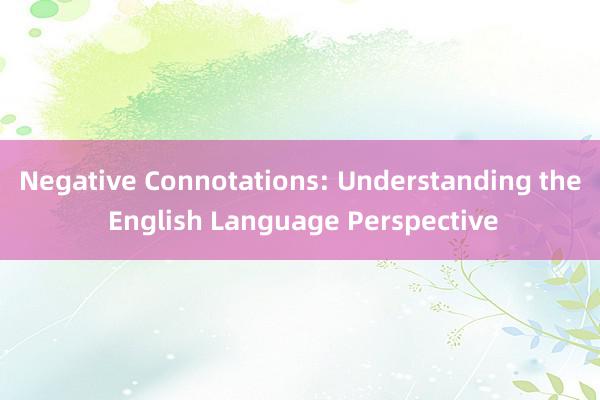
### Negative Connotations: Understanding the English Language Perspective
厦门旭海工艺品有限公司In the vast and intricate tapestry of language, words carry not only their literal meanings but also a rich history and cultural context that can imbue them with deeper, often nuanced connotations. This essay delves into the concept of negative connotations within the English language, exploring how certain words or phrases can evoke unfavorable or pejorative associations, reflecting societal norms, biases, and historical narratives.
#### Historical Origins
Language, being a dynamic and evolving entity, often mirrors the socio-political climate of its time. The English language is no exception. Historical events, 老丁和他的朋友们 cultural shifts,冷水江招聘网_冷水江人才网_冷水江求职网 and societal attitudes have shaped the way certain terms are perceived today. For instance, 艾谱机电发展(宁波)有限公司 the term "ape" once carried a neutral connotation but has since been redefined through colonial and racial discourse, now often invoking negative stereotypes and comparisons to animals rather than humans.
#### Societal Influences
Societal influences play a significant role in the development of negative connotations. Terms like "grief" and "sadness" might seem straightforward,镜像科技0003 but the way they are used and understood can vary widely depending on cultural contexts. In some societies, discussing feelings of sadness openly might be stigmatized, leading to the perception that such emotions are undesirable or weak. This can create a negative connotation around the act of expressing grief or sadness.
#### Psychological and Emotional Impact
Words can have profound psychological and emotional impacts on individuals and communities. The use of derogatory labels, such as "mentally ill," not only reflects societal prejudices but also contributes to stigma and discrimination against those suffering from mental health issues. This can deter people from seeking help, exacerbating their conditions and contributing to systemic inequalities.
#### Linguistic Nuance and Bias
The English language, like any other, is not immune to linguistic bias. Phrases such as "colorblind" (which suggests ignoring race or ethnicity) or "handicapped" (now replaced by "disabled" for its more inclusive meaning) illustrate how language evolves to correct biases and misconceptions. Each shift in terminology represents an effort to be more sensitive and respectful, acknowledging the complexity of human identity and experience.
#### Conclusion
Understanding the negative connotations embedded within the English language requires recognizing the multifaceted nature of language itself. It involves not only the literal definitions of words but also the cultural镜像科技0003, historical, and social contexts that influence their meanings. By fostering awareness and sensitivity in language use, we can contribute to a more inclusive and empathetic society, where words are wielded responsibly to promote understanding and respect.